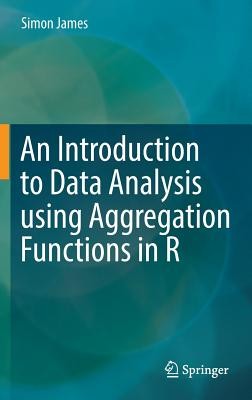
- We will send in 10–14 business days.
- Author: Simon James
- Publisher: Springer
- Year: 2016
- Pages: 210
- ISBN-10: 3319467611
- ISBN-13: 9783319467610
- Format: 15.6 x 23.4 x 1.3 cm, kieti viršeliai
- Language: English
- SAVE -10% with code: EXTRA
An Introduction to Data Analysis Using Aggregation Functions in R (e-book) (used book) | bookbook.eu
Reviews
Description
This textbook helps future data analysts comprehend aggregation function theory and methods in an accessible way, focusing on a fundamental understanding of the data and summarization tools. Offering a broad overview of recent trends in aggregation research, it complements any study in statistical or machine learning techniques. Readers will learn how to program key functions in R without obtaining an extensive programming background.
Sections of the textbook cover background information and context, aggregating data with averaging functions, power means, and weighted averages including the Borda count. It explains how to transform data using normalization or scaling and standardization, as well as log, polynomial, and rank transforms. The section on averaging with interaction introduces OWS functions and the Choquet integral, simple functions that allow the handling of non-independent inputs. The final chapters examine software analysis with an emphasis on parameter identification rather than technical aspects.
This textbook is designed for students studying computer science or business who are interested in tools for summarizing and interpreting data, without requiring a strong mathematical background. It is also suitable for those working on sophisticated data science techniques who seek a better conception of fundamental data aggregation. Solutions to the practice questions are included in the textbook.
EXTRA 10 % discount with code: EXTRA
The promotion ends in 22d.05:37:51
The discount code is valid when purchasing from 10 €. Discounts do not stack.
- Author: Simon James
- Publisher: Springer
- Year: 2016
- Pages: 210
- ISBN-10: 3319467611
- ISBN-13: 9783319467610
- Format: 15.6 x 23.4 x 1.3 cm, kieti viršeliai
- Language: English English
This textbook helps future data analysts comprehend aggregation function theory and methods in an accessible way, focusing on a fundamental understanding of the data and summarization tools. Offering a broad overview of recent trends in aggregation research, it complements any study in statistical or machine learning techniques. Readers will learn how to program key functions in R without obtaining an extensive programming background.
Sections of the textbook cover background information and context, aggregating data with averaging functions, power means, and weighted averages including the Borda count. It explains how to transform data using normalization or scaling and standardization, as well as log, polynomial, and rank transforms. The section on averaging with interaction introduces OWS functions and the Choquet integral, simple functions that allow the handling of non-independent inputs. The final chapters examine software analysis with an emphasis on parameter identification rather than technical aspects.
This textbook is designed for students studying computer science or business who are interested in tools for summarizing and interpreting data, without requiring a strong mathematical background. It is also suitable for those working on sophisticated data science techniques who seek a better conception of fundamental data aggregation. Solutions to the practice questions are included in the textbook.


Reviews